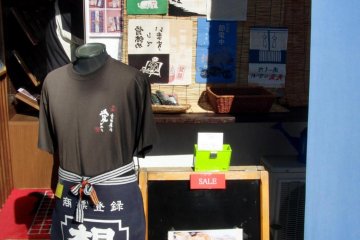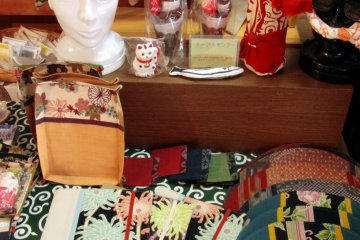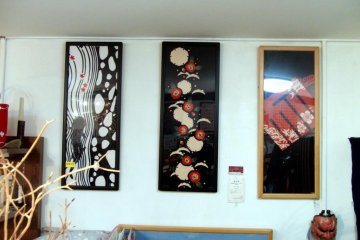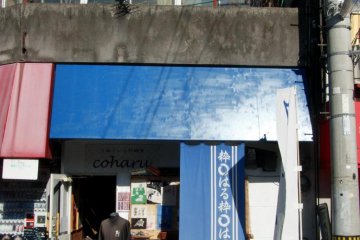Next to the tracks that emerge from the belly of Iyotetsu Takashimaya department store is a row of buildings with a distinctly post-war atmosphere. These are home to a number of small eateries and shops, one of which is Coharu, which bills itself as tenugui & wazakka – hand towels and Japanese sundries.
However, the English ‘hand towel’ doesn’t really do justice to the reality of tenugui. These are long rectangular strips of cotton or linen printed with patterns. From this simple concept springs a large number of applications – hand towel, scarf, bandana, table cloth, wall hanging and so on. Given this wide range of uses, it’s not surprising that graphic designers have made them the canvas for their work, since they represent an excellent opportunity to have one’s designs appear in many places. When used as a bandana, the Japanese tie tenugui in a variety of ways, including under the nose, for individualistic types who are immune to the ridicule of the culturally uninformed.
Coharu sells a wide variety of tenugui with patterns and images to suit any taste. Some are of a quality for framing and hanging as art. When I visited, there were three striking examples by a Tokyo designer on display. The shop also has furoshiki, large squares of cotton, silk, or synthetic material which used to serve the Japanese instead of plastic shopping bags for carrying their purchases and bathing necessities. Another popular offering is noren, the curtains that hang over the tops of doorways in restaurants, onsen and private homes. The owner told me that foreigners like to hang noren on their walls as a kind of tapestry, but using them as the Japanese do as curtains seems like a better use.
Another popular item is the sturdy canvas aprons, dyed a deep blue color called ai, with kanji and heraldic motifs in white. These are used by Japanese workers for hard service in various industries, so they’re made to be durable. They also look really cool. Apparently foreign visitors in the know prize the aprons for their style and practicality. They use them for gardening, cooking and other work that requires protecting the legs.
One wall of the shop is taken up with chopsticks in all styles. There are also a number of whimsical types, decorated with Daruma-san and the twelve creatures of the Asian zodiac. Coharu also has T-shirts with Japanesy designs. There are all Japanese “L” size, which is quite small.
Being light, compact, beautiful and reasonably priced, all of these things make excellent souvenirs. The various textile products typically come with instructions for use, making them practical too. The owner says he doesn’t speak any English and makes do with sign-language. Don’t go there looking for jikatabi, the split-toed, rubber-soled canvas boots, because they don’t sell them. But they certainly have plenty else of interest.












